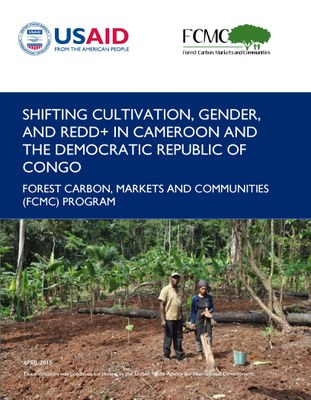Shifting Cultivation, Gender, and REDD+ in Cameroon and the Democratic Republic of the Congo
Shifting cultivation – also called swidden, slash-and-burn, or rotational cultivation – is the natural resource management system that underpins food production and livelihoods in the forest zones of Central African countries. It has been identified as a key driver of deforestation in Central Africa and is hence the focus of many international initiatives and projects that come under the rubric of REDD+ (Reducing Emissions from Deforestation and Forest Degradation and the role of conservation, sustainable management of forests and enhancements of forest carbon stocks). This report presents findings of field studies on shifting cultivation in the Democratic Republic of Congo (DRC) and Cameroon that were commissioned by the Forest Carbon, Markets and Communities (FCMC) Program. The field research was conducted in coordination with the Central African Program on the Environment (CARPE), a United States Agency for International Development (USAID) regional conservation and climate change program.
https://biodiversitylinks.org/projects/completed-projects/forest-carbon-markets-and-communities-fcmc-project/resources/shifting-cultivation-gender-and-redd-in-cameroon-and-the-democratic-republic-of-the-congo-folder/shifting-cultivation-gender-redd-cameroon-drc
https://biodiversitylinks.org/projects/completed-projects/forest-carbon-markets-and-communities-fcmc-project/resources/shifting-cultivation-gender-and-redd-in-cameroon-and-the-democratic-republic-of-the-congo-folder/shifting-cultivation-gender-redd-cameroon-drc/@@download/image/Shifting Cultivation.jpeg
Shifting Cultivation, Gender, and REDD+ in Cameroon and the Democratic Republic of the Congo
Shifting cultivation – also called swidden, slash-and-burn, or rotational cultivation – is the natural resource management system that underpins food production and livelihoods in the forest zones of Central African countries. It has been identified as a key driver of deforestation in Central Africa and is hence the focus of many international initiatives and projects that come under the rubric of REDD+ (Reducing Emissions from Deforestation and Forest Degradation and the role of conservation, sustainable management of forests and enhancements of forest carbon stocks). This report presents findings of field studies on shifting cultivation in the Democratic Republic of Congo (DRC) and Cameroon that were commissioned by the Forest Carbon, Markets and Communities (FCMC) Program. The field research was conducted in coordination with the Central African Program on the Environment (CARPE), a United States Agency for International Development (USAID) regional conservation and climate change program.
Download PDF
View Online:


